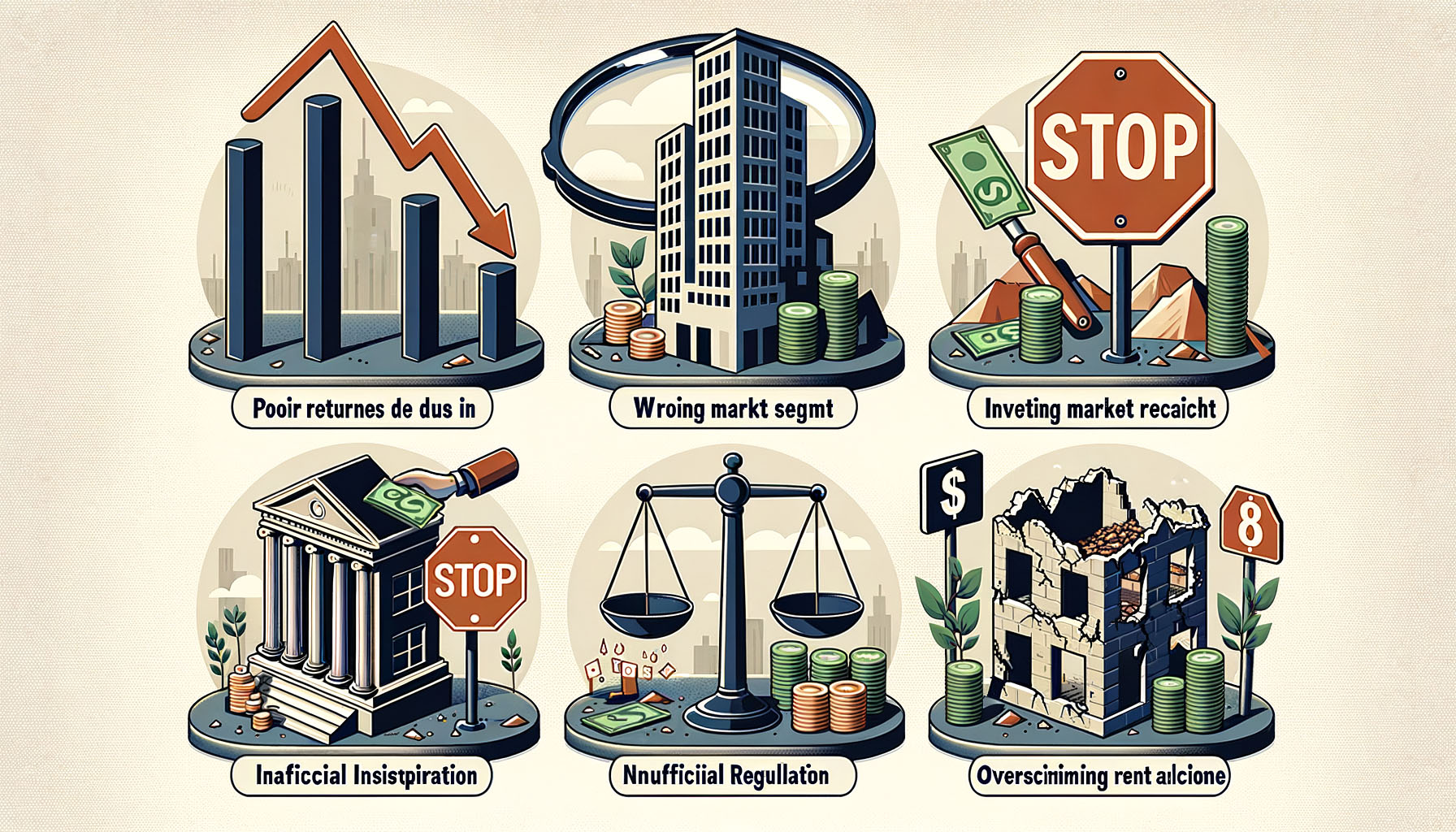
5 Critical Mistakes that Destroy Real Estate Investments
Real estate investing is one of the most popular and lucrative ways to invest capital. However, success in this field depends on many factors, and even experienced investors can make mistakes that devalue their investments. In this article, we'll look at five critical mistakes that can ruin your real estate investments and tell you how to avoid them.
1. Incorrect market segment selection
The most common and serious mistake investors make is investing in the wrong real estate market segment. Attracted by seeming opportunities, many invest in oversaturated or stagnant segments that have no potential for growth.
Consequences:
— Low return on investment
— Difficulty selling or leasing properties
— Long periods of downtime
Avoiding this mistake can be helped by thoroughly analyzing the market, studying supply and demand trends, and assessing the development prospects of different segments. Demographic, economic and social factors affecting the attractiveness of a particular segment should be taken into account.
2. Insufficient market research
The next critical mistake is insufficient real estate market research. Without a thorough analysis of market conditions, supply and demand, and the competitive environment, investors risk investing in areas with low demand or high competition.
Consequences:
— Long periods of idle properties
— Financial losses due to inability to rent or sell properties
— Low return on investment
To avoid this mistake, you should conduct in-depth market research that includes analyzing demographics, economic indicators, employment and migration trends. It is also necessary to study the supply and demand in the real estate market in the areas of interest, assess the level of competition and prospects for infrastructure development.
3. Insufficient financial planning
The third critical mistake that can devalue a real estate investment is insufficient financial planning. Many investors underestimate the amount of capital needed or mismanage cash flow, which can lead to financial instability, especially in the event of unexpected expenses or periods of low rental income.
Consequences:
— Financial difficulties in meeting the costs of maintaining the facilities
— Inability to service loans or borrowings
— Loss of liquidity and forced sale of assets at a loss
To avoid this mistake, you need to carefully plan the financial component of the project. Take into account not only the cost of acquiring real estate, but also the cost of repairs, maintenance, taxes, and form a reserve fund for unforeseen situations. Proper cash flow management and planning will allow you to avoid financial risks.
Install our app and get all the tools you need to search for real estate abroad in your smartphone! The mobile application will allow you to quickly access your personal account, manage your favorite properties and track your requests, directly exchange messages with sellers and buyers.

4. Ignoring local regulations
The fourth critical mistake that can have serious consequences is ignoring local regulations and zoning rules. Failure to comply with real estate laws can result in significant fines, project delays, or even outright cancellation.
Consequences:
— Fines and sanctions by regulatory agencies
— Delays and stoppage of construction works
— Revocation of permits and licenses
— Financial losses due to forced downtime of facilities
To avoid such problems, investors should carefully study all applicable regulations, zoning rules and city planning norms. It is also necessary to obtain all necessary permits and approvals prior to investing or construction work. Ignoring legislation can result in serious financial and reputational losses.
5. Overestimating potential rental income
Finally, the fifth critical mistake investors often make is overestimating the potential rental income of a property. Many tend to be overly optimistic when forecasting rental rates and occupancy rates for properties, without considering all potential expenses and down time.
Consequence:
— Underestimating the real costs of maintaining properties
— Exaggerated expectations of return on investment
— Financial difficulties in covering costs
To avoid this common mistake, investors should realistically estimate potential rental income. Market rents, supply and demand, marketing costs, property management costs and possible vacancy periods should all be carefully considered. Only an objective analysis of all factors will allow you to form realistic expectations and avoid financial losses.
Conclusion
Investing in real estate is a complex and multifaceted process that requires a comprehensive approach and careful preparation. By avoiding the five critical mistakes described in this article, you will be able to protect your investment and multiply your capital. Remember that miscalculations in market segment selection, insufficient research, poor financial planning, ignoring legislation and overestimating income can devalue your real estate investment.
Successful investors adhere to the following principles:
- Analyze the market thoroughly and select promising segments. Study trends in demand, supply, demographics and economic indicators.
- In-depth research of local real estate markets. Evaluate the level of competition, infrastructure, and neighborhood development prospects.
- Proper financial planning, taking into account all costs, reserves and risks. Properly manage cash flows.
- Strict adherence to regulations and zoning rules. Obtain necessary permits and approvals.
- Realistically estimate potential rental income based on market rates, demand, and potential vacancy periods.
By following these principles and avoiding common mistakes, you can build a successful real estate investment strategy and protect your investment from depreciation. Remember that every step in investing should be carefully considered and based on objective data and analysis. This is the only way to maximize your profits and minimize the risks associated with investing in real estate.
Don't be afraid to learn from other people's mistakes and apply time-tested strategies. The world of real estate investing can be complicated, but by following these tips, you can achieve success and financial stability.
 9
9
 6
6
 25.1
25.1  1
1  1
1  1
1  2
2  15
15
 18
18

New Zealand has radically reformed its investment visa program, turning it into one of the most accessible and flexible in the world. The removal of language requirements, a reduction in mandatory length of stay and an expansion of investment opportunities have led to a sharp increase in interest from foreign investors. We will tell you about the details of the reform, the benefits for investors and the impact on the region's economy.

House and rental prices in the EU continued their record growth in 2024, with real estate prices up 4.9% and rents up 3.2%. The Baltic and Central European countries such as Estonia, Lithuania and Hungary led the way, while some Western European countries experienced a cooling market. Experts predict a slowdown in price growth in 2025. We offer a detailed analysis of the trends and influencing factors.

Branded Residences are the next big thing in luxury real estate. Created in partnership with iconic brands, these luxury projects offer investors a unique combination of status, comfort and financial benefits. Find out why branded residences have become the number one choice for wealthy buyers around the world and how to become part of this exclusive club.























